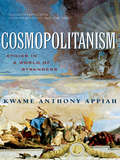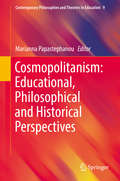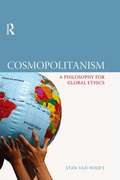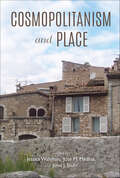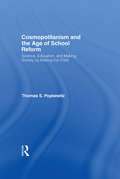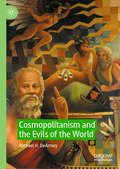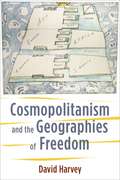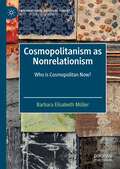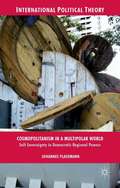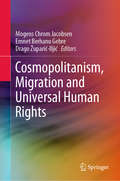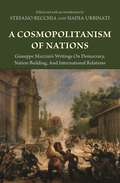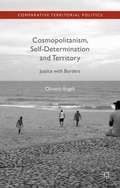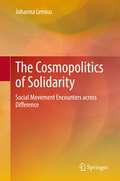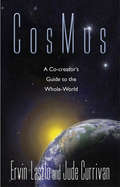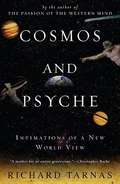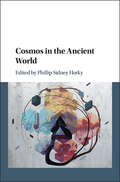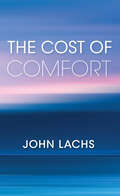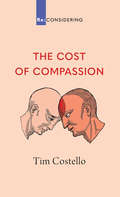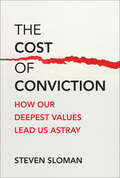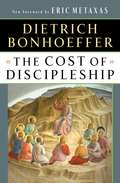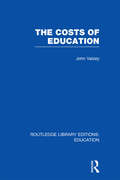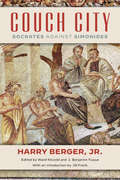- Table View
- List View
Cosmopolitanism: Ethics in a World of Strangers (Issues of Our Time) (Issues of Our Time #0)
by Kwame Anthony Appiah"A brilliant and humane philosophy for our confused age."--Samantha Power, author of A Problem from Hell Drawing on a broad range of disciplines, including history, literature, and philosophy--as well as the author's own experience of life on three continents--?Cosmopolitanism? is a moral manifesto for a planet we share with more than six billion strangers.
Cosmopolitanism: Educational, Philosophical and Historical Perspectives (Contemporary Philosophies and Theories in Education #9)
by Marianna PapastephanouThis volume discusses perspectives on cosmopolitanism, as well as concepts and the work of key figures. For example, it examines educational, philosophical and historical perspectives, deals with such issues as citizenship, internationalism, patriotism, globalization, hegemony and many other topics. It brings together works on Alain Badiou, Giorgio Agamben, Ernesto Laclau, Bruno Latour and Homi Bhabha with works on Whitman, Kant, Martha Nussbaum, Thomas Pogge, Onora O'Neill and Philippe Van Parijs. The book engages in the new dialogue on cosmopolitanism from a variety of outlooks. It advances that dialogue and problematizes it through as yet unexplored paths. Its chapters respond to the intricacies of current discourses on cosmopolitanism and related notions and take into account both affirmative and negative stances to cosmopolitanism and its educational significance. Overall, the book relies on such stances as background material in order to transcend them and offer fresh perspectives on cosmopolitan stakes. It makes use of a recent tendency in political philosophical and cultural-critical debates that opens a possibility of more nuanced approaches to old '-isms'.
Cosmopolitanism: A Philosophy for Global Ethics (Studies In Global Justice Ser. #6)
by Stan van HooftCosmopolitanism is a demanding and contentious moral position. It urges us to embrace the whole world into our moral concerns and to apply the standards of impartiality and equity across boundaries of nationality, race, religion or gender in a way that would have been unheard of even fifty years ago. It suggests a range of virtues which the cosmopolitan individual should display: virtues such as tolerance, justice, pity, righteous indignation at injustice, generosity toward the poor and starving, care for the global environment, and the willingness to take responsibility for change on a global scale. This book explains and espouses the values of cosmopolitanism, adjudicates between various forms of cosmopolitanism, and defends it against its critics.Cosmopolitanism has relevance for international distributive justice; peace; human rights; environmental sustainability; protection for minorities, refugees and other oppressed groups; democratic participation; and inter cultural tolerance. The book does not aim to impart factual information about global issues or to offer prescriptions for the solution of global problems. Rather, it highlights the ethical issues inherent in them and identifies the moral obligations that individuals, multinational corporations and governments might have in relation to them.While espousing a cosmopolitan form of global ethics, a liberal form of politics, sustainable and just forms of business practice, and an internationalist approach to global conflict and governance, it seeks to present as many sides of the ethical debates as can be supported by reasonable argument. Discussing the work of Kwame Anthony Appiah, Seyla Benhabib, Martha Nussbaum, Thomas Pogge, John Rawls, Amartya Sen, Henry Shue, Peter Singer and others, this book provides a clear and accessible survey of cosmopolitanism and analyses the reality of the rights and responsibilities that it espouses.
Cosmopolitanism and Place (American Philosophy)
by Jessica Wahman, José M. Medina, and John J. StuhrAddressing perspectives about who "we" are, the importance of place and home, and the many differences that still separate individuals, this volume reimagines cosmopolitanism in light of our differences, including the different places we all inhabit and the many places where we do not feel at home. Beginning with the two-part recognition that the world is a smaller place and that it is indeed many worlds, Cosmopolitanism and Place critically explores what it means to assert that all people are citizens of the world, everywhere in the world, as well as persons bounded by a universal and shared morality.
Cosmopolitanism and the Age of School Reform: Science, Education, and Making Society by Making the Child
by Thomas S. PopkewitzIn Cosmopolitanism and the Age of School Reform, noted educationalist Thomas Popkewitz explores turn-of-the-century and contemporary pedagogical reforms while illuminating their complex relation to cosmopolitanism. Popkewitz highlights how policies that include "all children" and leave "no child behind" are rooted in a philosophy of cosmopolitanism—not just in salvation themes of human agency, freedom, and empowerment, but also in the processes of abjection and the differentiation of the disadvantaged, urban, and child left behind as "Other."
Cosmopolitanism and the Evils of the World
by Michael H. DeArmeyThis book analyses five forms of transnational evils and offers cosmopolitan recommendations for reducing their occurrence. With civilisation in crisis it is crucial, now more than ever, to attempt to mitigate the catastrophes that face us in the decades to come. In a compelling and frightening account of transnational evil, DeArmey identifies and explores in depth the dark side of human behaviour, from genocide, slavery, torture and terrorism, to the greatest disaster of our time: the worldwide destruction of the earth’s biosphere. Building on Kant’s theory of a new world organisation designed to eliminate the evil of war and strengthen the world community, DeArmey develops a biotic and value-based theory of dignity, reconstructing a cosmopolitan world order that supports the Kantian theories of respect, care and hospitality. Cosmopolitan changes to the United Nations are proposed, including a bicameral assembly and, crucially, an environmental council with legal powers. In each chapter, cosmopolitan recommendations are made that will reduce the occurrence of the transnational evil in question; it is through these recommendations that the dignity and world citizenship of humanity can be protected and strengthened. Without them, we are headed towards the collapse of civilisation and mass extinction in the biosphere.
Cosmopolitanism and the Geographies of Freedom (The Wellek Library Lectures)
by David HarveyLiberty and freedom are frequently invoked to justify political action. Presidents as diverse as Woodrow Wilson, Franklin Delano Roosevelt, John F. Kennedy, Ronald Reagan, and George W. Bush have built their policies on some version of these noble values. Yet in practice, idealist agendas often turn sour as they confront specific circumstances on the ground. Demonstrated by incidents at Abu Ghraib and Guantánamo Bay, the pursuit of liberty and freedom can lead to violence and repression, undermining our trust in universal theories of liberalism, neoliberalism, and cosmopolitanism.Combining his passions for politics and geography, David Harvey charts a cosmopolitan order more appropriate to an emancipatory form of global governance. Political agendas tend to fail, he argues, because they ignore the complexities of geography. Incorporating geographical knowledge into the formation of social and political policy is therefore a necessary condition for genuine democracy. Harvey begins with an insightful critique of the political uses of freedom and liberty, especially during the George W. Bush administration. Then, through an ontological investigation into geography's foundational concepts-space, place, and environment-he radically reframes geographical knowledge as a basis for social theory and political action. As Harvey makes clear, the cosmopolitanism that emerges is rooted in human experience rather than illusory ideals and brings us closer to achieving the liberation we seek.
Cosmopolitanism and the Geographies of Freedom
by David HarveyLiberty and freedom are frequently invoked to justify political action. Presidents as diverse as Woodrow Wilson, Franklin Delano Roosevelt, John F. Kennedy, Ronald Reagan, and George W. Bush have built their policies on some version of these noble values. Yet in practice, idealist agendas often turn sour as they confront specific circumstances on the ground. Demonstrated by incidents at Abu Ghraib and Guantánamo Bay, the pursuit of liberty and freedom can lead to violence and repression, undermining our trust in universal theories of liberalism, neoliberalism, and cosmopolitanism. Combining his passions for politics and geography, David Harvey charts a cosmopolitan order more appropriate to an emancipatory form of global governance. Political agendas tend to fail, he argues, because they ignore the complexities of geography. Incorporating geographical knowledge into the formation of social and political policy is therefore a necessary condition for genuine democracy. Harvey begins with an insightful critique of the political uses of freedom and liberty, especially during the George W. Bush administration. Then, through an ontological investigation into geography's foundational concepts& mdash;space, place, and environment& mdash;he radically reframes geographical knowledge as a basis for social theory and political action. As Harvey makes clear, the cosmopolitanism that emerges is rooted in human experience rather than illusory ideals and brings us closer to achieving the liberation we seek.
Cosmopolitanism as Nonrelationism: Who is Cosmopolitan Now? (International Political Theory)
by Barbara Elisabeth MüllerThis book suggests that more can be said about cosmopolitanism than either the bold endorsement of a world state or the humble recognition of the equal moral worth of individuals, which makes everybody cosmopolitan. Identifying problems with the traditional concept and disentangling a variety of positions within the cosmopolitan paradigm, it introduces the more refined concept of cosmopolitanism as nonrelationism, which denies underived special duties among fellow citizens or other related individuals, such as family members or friends.Cosmopolitanism as nonrelationism promises to overcome an entrenched debate wherein everybody is a cosmopolitan, and brings back the radical character traditionally associated with the term. It portrays cosmopolitanism as a distinct and thorough position challenging classic proponents such as Barry, Caney, Nussbaum, and Pogge, and questioning their theories’ cosmopolitan character. Cosmopolitanism as nonrelationism has consequences for world politics without prescribing any unfeasible global order: It establishes normative criteria for evaluating institutions and provides guidance for the development of new ones.
Cosmopolitanism in Context
by Roland Pierik Wouter WernerIs it possible and desirable to translate the basic principles underlying cosmopolitanism as a moral standard into effective global institutions. Will the ideals of inclusiveness and equal moral concern for all survive the marriage between cosmopolitanism and institutional power? What are the effects of such bureaucratisation of cosmopolitan ideals? This volume examines the strained relationship between cosmopolitanism as a moral standard and the legal institutions in which cosmopolitan norms and principles are to be implemented. Five areas of global concern are analysed: environmental protection, economic regulation, peace and security, the fight against international crimes and migration.
Cosmopolitanism In A Multipolar World
by Johannes PlagemannPopular wisdom, international relations scholarship, and much of rising powers' foreign policy rhetoric contends that such powers comprise a conservative coalition united by the desire to protect the principle of national sovereignty against its erosion. However, the empirical analysis of three democratic rising and regional powers' understandings and practices of political sovereignty suggests otherwise. On the basis of empirical research in Brazil, India, and South Africa, this book presents a descriptive analysis of the transformation of sovereignty in non-western contexts since the end of the Cold War. The book argues that the processes of change are most accurately captured by a novel ideal-type of 'soft sovereignty'. Soft sovereignty takes into account today's complex multi-polar order in a post-western world. Such a plural, embedded, and moderate cosmopolitanism is situated between globalism's demand for a world state and statism's defence of the status quo.
Cosmopolitanism, Migration and Universal Human Rights
by Mogens Chrom Jacobsen Emnet Berhanu Gebre Drago Župarić-IljićThis book describes the potential and challenges of cosmopolitanism from a philosophical and historical point of view. Through the prism of cosmopolitanism, this book considers how the recent surge in migration is affecting our current reality, while also taking stock of the contemporary potential of cosmopolitan ideas. It considers and compares the significance of religion and culture for the wider societal acceptance or rejection of refugees. Moreover, the book examines the European Court of Human Rights jurisprudence on immigration policies, non-refoulement, humanitarian law and gender. It presents empirically based research of a quantitative, qualitative and comparative nature regarding the determinants of attitudes towards cosmopolitanism and more generally concerning public opinion on migration issues, and reflects on conceptions of and attitudes towards citizenship, while also imagining new forms of citizenship. This book serves as a comprehensive overview and resource for migration scholars from the social sciences and the humanities, as well as students and other stakeholders in the fields of migration and human rights.
A Cosmopolitanism of Nations: Giuseppe Mazzini's Writings on Democracy, Nation Building, and International Relations
by Giuseppe MazziniThis anthology gathers Giuseppe Mazzini's most important essays on democracy, nation building, and international relations, including some that have never before been translated into English. These neglected writings remind us why Mazzini was one of the most influential political thinkers of the nineteenth century--and why there is still great benefit to be derived from a careful analysis of what he had to say. Mazzini (1805-1872) is best known today as the inspirational leader of the Italian Risorgimento. But, as this book demonstrates, he also made a vital contribution to the development of modern democratic and liberal internationalist thought. In fact, Stefano Recchia and Nadia Urbinati make the case that Mazzini ought to be recognized as the founding figure of what has come to be known as liberal Wilsonianism. The writings collected here show how Mazzini developed a sophisticated theory of democratic nation building--one that illustrates why democracy cannot be successfully imposed through military intervention from the outside. He also speculated, much more explicitly than Immanuel Kant, about how popular participation and self-rule within independent nation-states might result in lasting peace among democracies. In short, Mazzini believed that universal aspirations toward human freedom, equality, and international peace could best be realized through independent nation-states with homegrown democratic institutions. He thus envisioned what one might today call a genuine cosmopolitanism of nations.
Cosmopolitanism, Self-Determination and Territory
by Oliviero AngeliRights over territory are to most cosmopolitans nowadays what private property was to nineteenth-century socialists: a legally sanctioned institutionalization of theft. In the cosmopolitan imagination, territories are reminiscent of a long history of unlawful acts and their boundaries do nothing but draw arbitrary distinctions between populations. This study moves beyond this picture of territory as a mere object of domination and exploitation to offer a new perspective on the traditional cosmopolitan understanding of territory. It explores the process by which people constitute themselves as territorially defined political communities and argues that the ideal of collective self-determination incorporates a legally and politically inclusive notion of territories as non-ascriptive markers of belonging. By examining the implications of this argument, the text addresses controversial issues of contemporary political philosophy: citizenship, immigration, natural resources and, more generally, global distributive justice.
The Cosmopolitics of Solidarity: Social Movement Encounters across Difference
by Johanna LeiniusThis volume discusses how commonality and difference are negotiated across heterogeneous social movements in Latin America, especially Peru. It applies cosmopolitics as an analytical lens to understand the intricacies of social movement encounters across difference, without imposing colonial hierarchies or categorizations. The author blends multiple theoretical approaches—such as social movement research, postcolonial feminism, and post-foundational discourse theory—with ethnographic insights to develop a theory of cosmopolitical solidarity. Providing a transnational and intersectional perspective on the politics of social justice in a postcolonial context, this book will appeal to students of social movements, gender studies, racism, Latin American studies, and international relations, as well as practitioners involved in activism, social work, or international cooperation.
CosMos: Guide De Cocréation Du Monde-entier (Colección Nueva Ciencia Ser.)
by Ervin Laszlo Jude CurrivanWe stand at the threshold of a revolutionary and empowering new vision of the world. The discoveries of leading-edge science and the insights of spirituality are converging to reveal that the CosMos and all that we term reality is wholly integrated, and that at its most fundamental level, it is a field of information. This is the elemental cosmic mind from which everything emanates, is manifested, and to which all ultimately returns. Research is also demonstrating what the mystics of all traditions have discerned: that we have the innate ability to envision, understand, and experience the CosMos at levels far beyond the limitations of our human persona. CosMos is co-authored by two explorers who combine almost a century of seeking to understand not only how the world is as it is, but why. Philosopher Ervin Laszlo, Ph.D., and healer and scientist Jude Currivan, Ph.D., offer a revisioned view of the world that is no longer fragmented, but is at last, whole. Theirs is a perception of a meaningful and co-creative world that is exquisitely tuned to be "as simple as it can be" for consciousness to explore itself. In these momentous times, the vision shared in Cosmos invites us to open our hearts and minds to re-member who we really are and to take our places as conscious co-creators of our realities and of our evolving cosmic destiny.
Cosmos and Psyche: Intimations of a New World View
by Richard TarnasFrom a philosopher whose magisterial history of Western thought was praised by Joseph Campbell and Huston Smith comes a brilliant new book that traces the connection between cosmic cycles and archetypal patterns of human experience. Drawing on years of research and on thinkers from Plato to Jung, Richard Tarnas explores the planetary correlations of epochal events like the French Revolution, the two world wars, and September 11. Whether read as astrology updated for the quantum age or as a contemporary classic of spirituality, Cosmos and Psyche is a work of immense sophistication, deep learning, and lasting importance.
Cosmos in the Ancient World
by Phillip Sidney HorkyHow did the ancient Greeks and Romans conceptualise order? This book answers that question by analysing the formative concept of kosmos ('order', 'arrangement', 'ornament') in ancient literature, philosophy, science, art, and religion. This concept encouraged the Greeks and Romans to develop theories to explain core aspects of human life, including nature, beauty, society, politics, the individual, and what lies beyond human experience. Hence, Greek kosmos, and its Latin correlate mundus, are subjects of profound reflection by a wide range of important ancient figures, including philosophers (Parmenides, Empedocles, the Pythagoreans, Democritus, Plato, Aristotle, the Stoics, Lucretius, Cicero, Seneca, Plotinus), poets and playwrights (Sophocles, Euripides, Aristophanes, Plautus, Marcus Argentarius, Nonnus), intellectuals (Gorgias, Protagoras, Varro), and religious exegetes (Philo, the Gospel Writers, Paul). By revealing kosmos in its many ancient manifestations, this book asks us to rethink our own sense of 'order', and to reflect on our place within a broader cosmic history.
The Cost of Comfort (American Philosophy)
by John LachsWhy do we feel empty when our lives seem so full? A philosopher&’s &“clear, engaging reflection&” on the psychic risks of today&’s world (John T. Lysaker, author of After Emerson). While comfort has not always reached everyone evenly, most of us who live in the United States today reap the benefits of modern life. We live longer, we eat better food, we have access to good medical care, and we can stay in touch with loved ones who are far away. Yet, as philosopher John Lachs observes, these comfortable lives come at a cost: our increasing unhappiness. Irresponsible behavior, including by those in positions of power in governments and corporations, only increases and multiplies feelings of bitterness and disaffection. In this book, Lachs argues that this dizzyingly complex world often inspires isolation, and that deeper engagement with it is required in order to dispel our growing psychic distance. Lachs advocates for mediation and champions education, advertising, openness, and transparency to help individuals understand the roles they play in society and to nullify claims to blamelessness. Lachs suggests new rules for responsibility and argues that examining and understanding the consequences of one&’s actions is imperative to overcoming the ills and problems of the modern world—and to find the fulfillment we seek. &“A very clear, engaging reflection on a genuine contemporary issue: deep feelings of disengagement and bewilderment about how to live responsibly in an almost overwhelmingly complex world.&” —John T. Lysaker, author of After Emerson
The Cost of Compassion (Re: CONSIDERING)
by Tim CostelloRe:CONSIDERING invites you to look at what’s familiar from an unfamiliar angle. To consider how we consider things – and how to do it better.Who’s in favour of compassion?Pretty much everybody, actually. Left or right, religious or not, nobody seems to have a bad word to say about compassion.So why do we have so much trouble addressing the conflict, inequality, and suffering in our world?Ranging from the streets of St Kilda to the slums of Delhi, from Plato to Nietzsche, the Dalai Lama to Peter Singer, and from Seinfeld to the Good Samaritan, Tim Costello appeals to our common humanity – and takes an unflinching look at how costly compassion can be.
The Cost of Conviction: How Our Deepest Values Lead Us Astray
by Steven SlomanA timely and important perspective on how people frame decisions and how relying on sacred values unwittingly leads to social polarization.When you are faced with a decision, do you consider the best outcome, or do you consider your deepest values about which actions are appropriate? The Cost of Conviction contrasts these two primary strategies for making decisions: consequentialism or prioritizing one&’s sacred values. Steven Sloman argues that, while both modes of decision making are necessary tools for a good decision maker, people err by deploying sacred values more often than they should, especially when it comes to sociopolitical issues. As a result, we oversimplify, grow disgusted and angry, and act in ways that contribute to social polarization. In this book, Sloman provides a new understanding of today&’s societal ills and grounds that understanding in science.Drawing on historical and current examples of the two decision-making strategies in action, the author provides a thorough overview of the psychology of decision making, including work on judgment, conscious and unconscious decision-making processes, the roles of emotion, and even an analysis of habit and addiction. With its unique emphasis on sacred values, The Cost of Conviction is an eye-opening must-read for all decision makers, especially those who wish to understand judgment, social decision making, and leadership.
The Cost of Discipleship (Shepherd's Notes Ser.)
by Dietrich BonhoefferOne of the most important theologians of the twentieth century illuminates the relationship between ourselves and the teachings of Jesus in this classic text on ethics, humanism, and civic duty.What can the call to discipleship, the adherence to the word of Jesus, mean today to the businessman, the soldier, the laborer, or the aristocrat? What did Jesus mean to say to us? What is his will for us today? Drawing on the Sermon on the Mount, Dietrich Bonhoeffer answers these timeless questions by providing a seminal reading of the dichotomy between "cheap grace" and "costly grace." "Cheap grace," Bonhoeffer wrote, "is the grace we bestow on ourselves...grace without discipleship....Costly grace is the gospel which must be sought again and again, the girl which must be asked for, the door at which a man must know....It is costly because it costs a man his life, and it is grace because it gives a man the only true life." The Cost of Discipleship is a compelling statement of the demands of sacrifice and ethical consistency from a man whose life and thought were exemplary articulations of a new type of leadership inspired by the Gospel, and imbued with the spirit of Christian humanism and a creative sense of civic duty.
The Costs and Benefits of Animal Experiments
by Andrew KnightA comprehensive review of recent scientific evidence examining the contributions of animal experimentation to human healthcare. The book also explores toxicity prediction, animal use during life and health sciences education, impacts on student attitudes toward animals, and the extent to which animals suffer in laboratories.
The Costs of Education (Routledge Library Editions: Education)
by John VaizeyThis is the first book which authoritatively reviews the UK expenditure on education from 1920 – 1955, both by local authorities and private schools. The book takes the main elements of education in turn and discusses them in detail. There are original studies of local authority finance, of teachers’ pay and of the economics of private education. It examines educational spending by social class and compares the growth of educational services in England and Wales, Scotland and Northern Ireland.
Couch City: Socrates against Simonides
by Harry BergerCrowning six decades of literary, rhetorical, and historical scholarship, Harry Berger, Jr., offers readers another trenchant reading. Berger subverts the usual interpretations of Plato’s kalos kagathos, showing Socrates to be trapped in a double ventriloquism, tethered to his interlocutors’ speech acts even as they are tethered to his. Plato’s Republic and Protagoras both reserve a small but significant place for a poet who differs from Homer and Hesiod: the lyric poet Simonides of Ceos. In the Protagoras, Socrates takes apart a poem attributed to Simonides and uses this to finish off the famous and supposedly dangerous sophist, Protagoras. Couch City is a close reading of the comic procedures Socrates deploys against Protagoras as he reduces him to silence. But it also shows that Socrates takes the danger posed by Protagoras and his fellow sophists seriously. Even if they are represented as buffoons, sophists are among the charismatic authority figures—poets, rhapsodes, seers, orators, and lawgivers—who promote views harmful to Athenian democracy. Socrates uses Simonides’s poem to show how sophists not only practice misinterpretation but are unable to defend against it. Berger ports his roots as a pioneering literary theorist into this rhetorical discussion, balancing ideas such as speech-act theory with hard-nosed philology. The result is a provocative and counterintuitive reassessment of Plato’s engagement with democracy.
